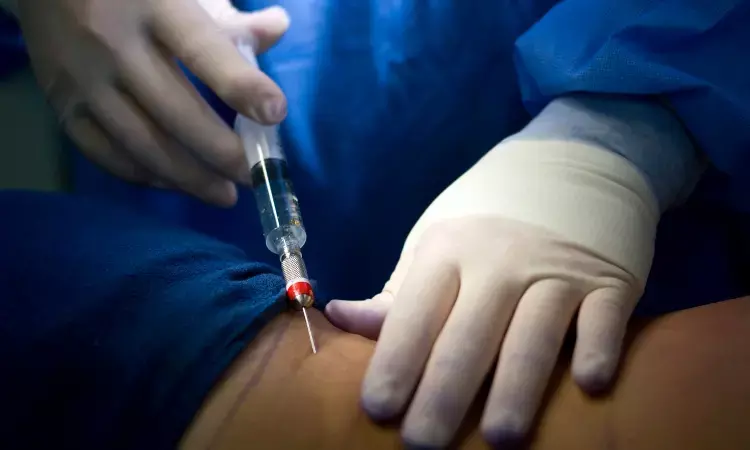- Home
- Medical news & Guidelines
- Anesthesiology
- Cardiology and CTVS
- Critical Care
- Dentistry
- Dermatology
- Diabetes and Endocrinology
- ENT
- Gastroenterology
- Medicine
- Nephrology
- Neurology
- Obstretics-Gynaecology
- Oncology
- Ophthalmology
- Orthopaedics
- Pediatrics-Neonatology
- Psychiatry
- Pulmonology
- Radiology
- Surgery
- Urology
- Laboratory Medicine
- Diet
- Nursing
- Paramedical
- Physiotherapy
- Health news
- Fact Check
- Bone Health Fact Check
- Brain Health Fact Check
- Cancer Related Fact Check
- Child Care Fact Check
- Dental and oral health fact check
- Diabetes and metabolic health fact check
- Diet and Nutrition Fact Check
- Eye and ENT Care Fact Check
- Fitness fact check
- Gut health fact check
- Heart health fact check
- Kidney health fact check
- Medical education fact check
- Men's health fact check
- Respiratory fact check
- Skin and hair care fact check
- Vaccine and Immunization fact check
- Women's health fact check
- AYUSH
- State News
- Andaman and Nicobar Islands
- Andhra Pradesh
- Arunachal Pradesh
- Assam
- Bihar
- Chandigarh
- Chattisgarh
- Dadra and Nagar Haveli
- Daman and Diu
- Delhi
- Goa
- Gujarat
- Haryana
- Himachal Pradesh
- Jammu & Kashmir
- Jharkhand
- Karnataka
- Kerala
- Ladakh
- Lakshadweep
- Madhya Pradesh
- Maharashtra
- Manipur
- Meghalaya
- Mizoram
- Nagaland
- Odisha
- Puducherry
- Punjab
- Rajasthan
- Sikkim
- Tamil Nadu
- Telangana
- Tripura
- Uttar Pradesh
- Uttrakhand
- West Bengal
- Medical Education
- Industry
Use of Local anesthesia in postoperative phase reduces chance of delirium

Results of a new study conducted by Andrea Fanelli and peers show that usage of regional analgesic strategies in the postoperative phase might reduce postoperative delirium. The findings of this study were published in Minerva Anestesiologica.
Postoperative delirium is common in the senior surgical population. Although a thorough list of predicting indicators is unclear, an opioid-sparing strategy using regional anesthetic methods has been proposed to reduce its occurrence. Researchers did a systematic review and meta-analysis to explore the possible influence of regional anesthesia and analgesia on postoperative delirium due to a lack of clear information on the issue.
For randomized studies comparing localized anesthetic or analgesia to systemic therapies in patients undergoing any form of surgery, databases were searched. The Preferred Reporting Items for Systematic Reviews and Meta-Analyses (PRISMA) statement was followed in this systematic review and meta-analysis. Random effects modeling was used to pool the findings for each of these two applications independently. To assess the certainty of evidence and the strength of findings, the Grading of Recommendations Assessment, Development, and Evaluation (GRADE) approach was utilized.
The key findings of this study were:
1. There were eighteen trials (3361 individuals) involved.
2. With a relative risk (RR) of 1.21 (95% CI: 0.79 to 1.85; P=0.3800), using localized methods for surgical anesthetic failed to minimize the incidence of postoperative delirium.
3. When compared to systemic analgesia, localized analgesia reduced the relative risk of perioperative delirium by 0.53 (95% CI: 0.42 to 0.68; P0.0001).
4. A post-hoc subgroup study of hip fracture surgery revealed comparable results.
In conclusion, from the findings of this study, it is evident that numerous variables may impact surgical delirium, intraoperative regional anesthesia alone may not reduce it.
Reference:
FANELLI, A., BALZANI, E., MEMTSOUDIS, S., ABDALLAH, F. W., & MARIANO, E. R. (2022). Regional anesthesia techniques and postoperative delirium: systematic review and meta-analysis. In Minerva Anestesiologica (Vol. 88, Issue 6). Edizioni Minerva Medica. https://doi.org/10.23736/s0375-9393.22.16076-1
Neuroscience Masters graduate
Jacinthlyn Sylvia, a Neuroscience Master's graduate from Chennai has worked extensively in deciphering the neurobiology of cognition and motor control in aging. She also has spread-out exposure to Neurosurgery from her Bachelor’s. She is currently involved in active Neuro-Oncology research. She is an upcoming neuroscientist with a fiery passion for writing. Her news cover at Medical Dialogues feature recent discoveries and updates from the healthcare and biomedical research fields. She can be reached at editorial@medicaldialogues.in
Dr Kamal Kant Kohli-MBBS, DTCD- a chest specialist with more than 30 years of practice and a flair for writing clinical articles, Dr Kamal Kant Kohli joined Medical Dialogues as a Chief Editor of Medical News. Besides writing articles, as an editor, he proofreads and verifies all the medical content published on Medical Dialogues including those coming from journals, studies,medical conferences,guidelines etc. Email: drkohli@medicaldialogues.in. Contact no. 011-43720751


